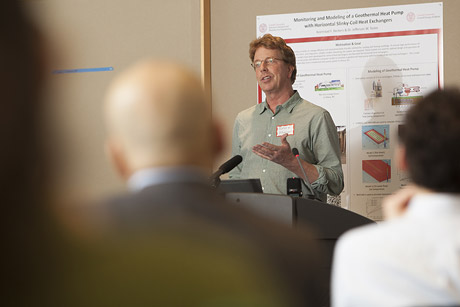Faculty stir up solutions at climate change forum
By Blaine Friedlander

Trade unions, say hello to the green economy. Carbon governance, you’re part of industrial revolution history. Forest, fisheries and coral reef conservation, meet world food demand.
From the far-flung quadrants of campus, about 100 faculty members of the Cornell community gathered March 28 – some meeting for the first time – at the Interdisciplinary Climate Change Forum. At a meeting of the minds, professors, graduate students and researchers affiliated with the David R. Atkinson Center for a Sustainable Future exchanged ideas about projects and studies in energy, the environment and economic development – in the era of climate change.
“It was a great array of faculty and graduate students from fields ranging from the physical and natural sciences to economics and the humanities,” said David Wolfe, professor of horticulture and a conference organizer. “The creative energy in the room was almost palpable. I think this is what happens when we hear surprising and mind-opening perspectives from those in very different disciplines. Exciting ideas for future collaboration across these disciplines came forward.”
The afternoon forum featured pitches from 36 researchers from Cornell’s colleges, explaining in 90 seconds or less the highlights of current projects. For example, Margaret Smith, professor of plant breeding and genetics, explained how she was tailoring corn for climate change stress tolerance and sustainable production in New York state, while Rebecca Schneider, associate professor of natural resources, talked on water resource management and how we might expect more extreme weather.
Economist Howard Chong, assistant professor from the School of Hotel Administration, enlightened the group on fighting climate change by tracking home thermostats. Professors from the humanities also provided input: Aaron Sachs, history, pinpointed the exact date and time when human use of energy became divorced from the resources used to produce it: Sept. 4, 1882 – at 3 p.m. – the very moment that Thomas Edison flipped the switch on light bulbs in lower Manhattan, while some distance away workers shoveled coal to generate the power.
Sean Sweeney, ILR, director of Cornell’s Global Labor Institute, spoke on the Trade Unions for Energy Democracy initiative, which promotes solutions to the climate crisis, energy poverty and the degradation of land and people, all the while protecting workers’ rights.
In addition to pitches, graduate students presented posters on current research. Joe Usack explained an upcoming project on how capturing waste heat from biogas generators can cool cows on upstate New York’s dairy farms; Sonam Sherpa showed new approaches to soil carbon mapping; and Semagn Kolech demonstrated potato variety resilience to drought being studied in Ethiopia.
Judges awarded the forum’s best graduate student posters to Thea Whitman for biochar-soil carbon priming; Janet Barclay for agricultural runoff; and Allison Tracy for how warming oceans affect coral.
Two breakout sessions covered social, political and economics challenges for energy change and retrofitting cities; climate change tipping points and human health; professional responsibility, outreach and advocacy; and food security and agricultural solutions.
“Cornell has massive interdisciplinary capability and faculty drive to move the world forward on solutions to climate change,” said Drew Harvell, associate director for environment at the Atkinson Center, who also organized the conference. The solutions vary “from engineering solutions and social sciences communication strategies to dialing back greenhouse gas emissions to developing better capability to detecting and forecasting tipping points in the Earth’s life support systems to building capability to assist in the adaptation and mitigation juggernaut bearing down on us.”
Media Contact
Get Cornell news delivered right to your inbox.
Subscribe